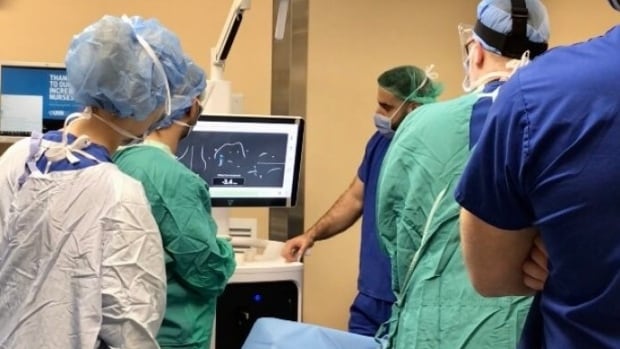When Steven Gotal was having difficultly enjoying his European vacation last year due to agonizing knee pain, he knew it was likely time for surgery.
The 75-year-old Mississauga man had problems with his left knee decades ago, but now it was affecting his ability to do simple tasks like walking and going up and down the stairs.
“It was starting to be very painful,” he explained, saying he also could no longer participate in some of his favourite activities like cycling and swimming.
Gotal paid a visit to Dr. Michael Zywiel, an orthopedic surgeon and clinician investigator with the Schroeder Arthritis Institute at Toronto’s University Health Network.
Zywiel had an interesting proposal: Gotal could be the first patient in the country to undergo knee replacement surgery with a new robotic device at Toronto Western Hospital, where hundreds of knee replacement procedures are performed every year.
Gotal agreed, and said he jokingly told the surgeon he hoped he had practised. He underwent a successful operation last Friday, and is on the road to recovery.
The robot, known officially as the VELYS robotic assisted device, was funded entirely through a donation.
Built by Depuy Synthes, a U.S. medical device company, Zywiel says the robot allows the team to more accurately plan and execute the surgery.. He explains this is important because every patient’s knee is a little different and needs implants in a slightly different position. He says a fairly large percentage of patients aren’t satisfied with the outcome of their knee replacements and this new device can potentially save them a lot of pain and additional surgery.
“The robot lets us very accurately perform the exact cuts we want to perform,” he said.

“So there’s much less trauma to the knee and especially to all the ligaments and muscles in the knee, and ultimately what that means is getting out of hospital sooner, recovering faster and getting back to the things they want to do in their regular life as fast as possible.”
Zywiel says using the device also means far less equipment and instrumentation is needed. Additionally, the patient doesn’t require pre-operative scans, saving time and resources.
“Within an hour or two, they can get up and walk and put their weight on it and go home and get recovered faster than they would be if we didn’t have this technology helping us,” he said.

It’s estimated around 700 knee replacements are performed at Toronto Western Hospital annually, making it one of the most common surgical procedures. Zywiel believes the new technology will improve the outcomes and result in happier, more satisfied patients.
“So if we can make even a small dent in that proportion of people who struggle with their recovery and struggle to get a good outcome, all that’s going to do is free up resources so we can look after all the other people with knee arthritis who need our care,” he said.
Zywiel says his team will also have the opportunity to train other staff from hospitals in the GTA and internationally on how to use the device. The training process is more than a year long.
Gotal says his recovery is going smoothly. He’s getting up and down the stairs and around his home with far less pain, and is no longer using a walker.
He’s confident he’ll be cycling and swimming again in the near future, and doesn’t regret being the first patient in the country to undergo surgery with the new device.
“I’m very happy and I am so thankful to the hospital staff,” he said.
“I feel so blessed.”


